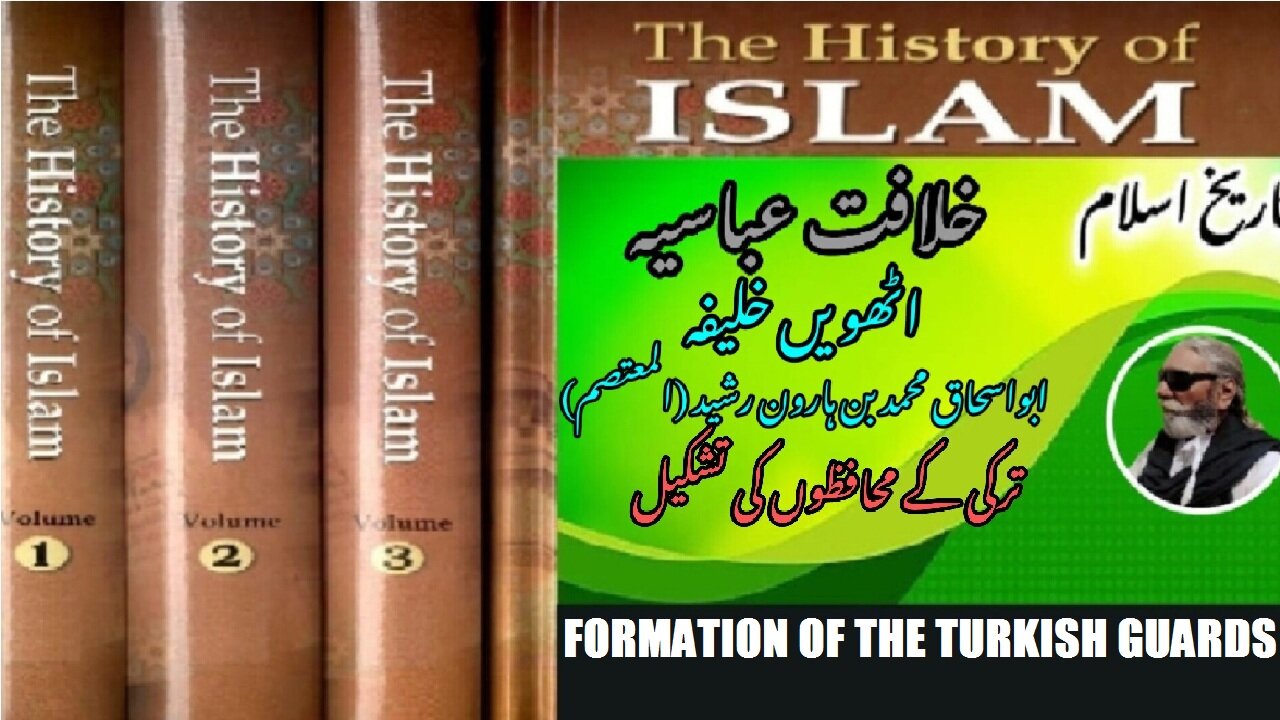Premium Only Content

Formation of the Turkish guard by 8th Caliph of Abbasid Caliphate
@islamichistory813 #AbbasidCaliphate #TurkishGuard #IslamicHistory #Caliphate #MilitaryHistory
Formation of the Turkish guard by 8th Caliph of Abbasid Caliphate
Asslamoalaikum sisters brothers friends and elders, In this educational and informative video, we delve into the fascinating history of the Abbasid Caliphate, focusing on the formation of the Turkish guard by the 8th Caliph. Discover the intriguing story behind this significant military reform and understand its impact on the socio-political landscape of the time. be with us for an in-depth exploration that enriches your knowledge of Islamic history and its influential figures. Don’t forget to like, comment, and share this video to spread the knowledge!
Abu Ishaq began forming his corps of Turkish troops. The first members of the corps were domestic slaves he bought in Baghdad (the distinguished general Itakh was originally a cook) whom he trained in the art of war, but they were soon complemented by Turkish slaves sent directly from the fringes of the Muslim world in Central Asia, under an agreement with the local Samanid[d] rulers. This private force was small—it probably numbered between three and four thousand at the time of his accession to the throne—but it was highly trained and disciplined, and made Abu Ishaq a man of power in his own right, as al-Ma'mun increasingly turned to him for assistance. For the first time, special military uniforms were introduced for this praetorian Turkic guard.
The long civil war shattered the social and political order of the early Abbasid state; the abn?? al-dawla, the main political and military pillar of the early Abbasid state, had been much reduced by the civil war. Along with the abn??, the old Arab families settled in the provinces since the time of the Muslim conquests, and the members of the extended Abbasid dynasty formed the core of the traditional elites and largely supported al-Amin. During the remainder of al-Ma'mun's reign they lost their positions in the administrative and military machinery, and with them their influence and power. Furthermore, as the civil war raged in the eastern half of the caliphate and in Iraq, the western provinces slipped from Baghdad's control in a series of rebellions that saw local strongmen claiming various degrees of autonomy or even trying to secede from the caliphate altogether. Although he had overthrown the old elites, al-Ma'mun lacked a large and loyal power base and army, so he turned to "new men" who commanded their own military retinues. These included the Tahirids, led by Abdallah ibn Tahir, and his own brother Abu Ishaq. Abu Ishaq's Turkish corps was politically useful to al-Ma'mun, who tried to lessen his own dependence on the mostly eastern Iranian leaders, such as the Tahirids, who had supported him in the civil war, and who now occupied the senior positions in the new regime. In an effort to counterbalance their influence, al-Ma'mun granted formal recognition to his brother and his Turkish corps. For the same reason he placed the Arab tribal levies of the Mashriq (the region of the Levant and Iraq) in the hands of his son, al-Abbas.
The nature and identity of the "Turkish slave soldiers", as they are commonly described, is a controversial subject; both the ethnic label and the slave status of its members are disputed. Although the bulk of the corps were clearly of servile origin, being either captured in war or purchased as slaves, in the Arabic historical sources they are never referred to as slaves (maml?k or ?abid), but rather as maw?l? ("clients" or "freedmen") or ghilm?n ("pages"), implying that they were manumitted, a view reinforced by the fact that they were paid cash salaries. Although members of the corps are collectively called simply "Turks", atr?k, in the sources, prominent early members were neither Turks nor slaves, but rather Iranian vassal princes from Central Asia like al-Afshin, prince of Usrushana, who were followed by their personal retinues (Persian chakar, Arabic sh?kiriyya).Likewise, the motives behind the formation of the Turkish guard action are unclear, as are the financial means available to Abu Ishaq for the purpose, particularly given his young age. The Turks were closely associated with Abu Ishaq, and are usually interpreted as a private military retinue, something not uncommon in the Islamic world of the time. As the historian Matthew Gordon points out, the sources provide some indications that the original recruitment of Turks may have been begun or encouraged by al-Ma'mun, as part of the latter's general policy of recruiting Central Asian princes—and their own military retinues—to his court. It is therefore possible that the guard was originally formed on Abu Ishaq's initiative, but that it quickly received caliphal sanction and support, in exchange for being placed under al-Ma'mun's service.
Allah Hafiz
===========================================
-
 3:55:42
3:55:42
STARM1X16
7 hours agoMerry Christmas Fortnite
46.8K5 -
 2:45:33
2:45:33
Sgtfinesse
7 hours agoMerry Christmas Night
45.4K16 -
 3:51:18
3:51:18
tacetmort3m
23 hours ago🔴 LIVE - (MERRY CHRISTMAS) TIME TO SPREAD DEMOCRACY - HELLDIVERS 2 OMENS OF TYRANNY
23.4K2 -
 12:42
12:42
Cooking with Gruel
21 hours agoBrown Butter Trifle with Salted Caramel and Cinnamon Apple
18.4K3 -
 2:46
2:46
BIG NEM
10 hours agoDiscovering RAKIJA: The Holy Liquer of the Balkans
15.4K2 -
 1:11:38
1:11:38
Film Threat
15 hours agoCHRISTMAS DAY CHILL STREAM WITH CHRIS GORE | Hollywood on the Rocks
136K30 -
 14:22:40
14:22:40
The Quartering
1 day agoYule Log Christmas MAGA Edition With Memes! Come Hang Out!
226K29 -
 38:41
38:41
MYLUNCHBREAK CHANNEL PAGE
1 day agoTimeline Begins in 1800? - Pt 1 & 2
106K58 -
 1:23:41
1:23:41
Game On!
1 day ago $13.73 earnedNetflix NFL Christmas Games Preview and Predictions!
92.7K12 -
 2:05:07
2:05:07
Darkhorse Podcast
1 day agoWhy Trump Wants Greenland: The 257th Evolutionary Lens with Bret Weinstein and Heather Heying
321K878